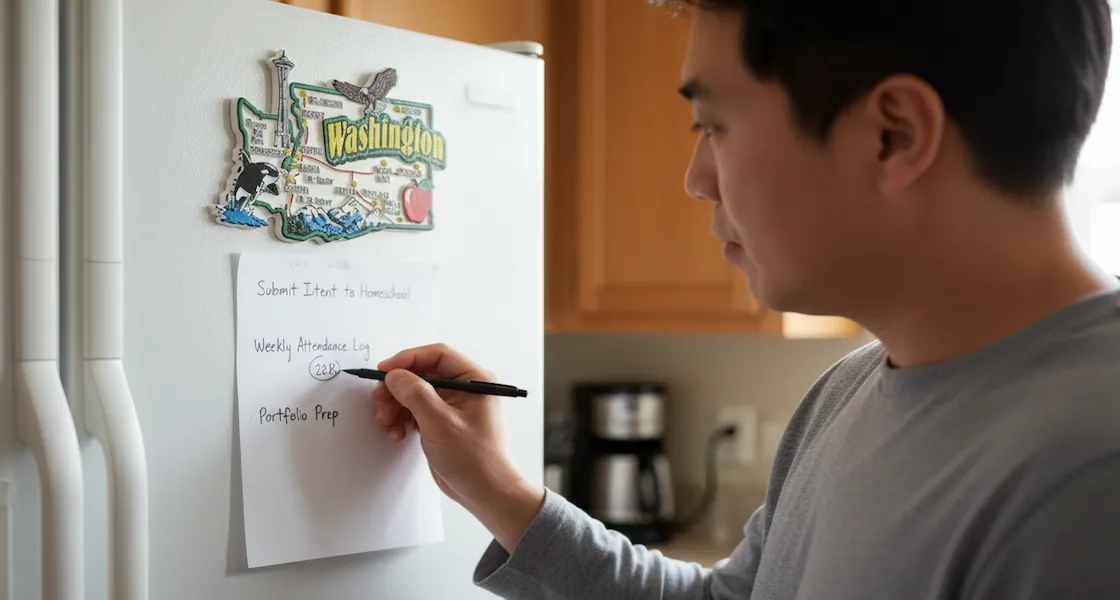Every child learns differently, and homeschooling allows you to create a customized plan that matches your child’s unique learning style. Instead of working around someone else’s schedule, you have the chance to build a day-to-day routine that matches your child’s energy and interests.
Washington makes it easy to get started with homeschooling by providing clear steps and several options for how you can structure your homeschooling program.To make the most of this flexibility, you can also turn to Outschool’s wide range of live online classes, which bring expert teaching and social interaction right into your home.
Homeschooling options in Washington
Washington offers two pathways for homeschooling, so you can choose the one that best suits your family’s needs.
Home-based instruction
Home-based instruction is the main pathway families use to homeschool in Washington. It gives you full control over your child’s education, as long as you meet the state’s requirements for parent qualifications, instruction hours, and subjects. You decide on the curriculum, schedule, and approach, with the flexibility to adapt learning to your child’s pace and interests.
Private school extension programs
Some private schools in Washington offer home-based education as part of their programs. In this setup, you enroll your child in the private school, and the school provides oversight and support while you teach at home.
This option can be a good fit if you want more structure or outside accountability while still keeping learning home-centered. The enrollment process and requirements vary, so it's best to reach out to your chosen school directly.
Requirements for homeschooling in Washington
Washington homeschooling laws come with a few clear requirements that parents need to follow. Once you understand these basics, you’ll have a solid framework for planning your homeschool with confidence.
Enrollment paperwork
The first step in homeschooling legally in Washington is filing a Declaration of Intent. This form lets your local school district know that you’ve chosen to homeschool your child.
- When to file: Submit your declaration each year by September 15, or within two weeks if you begin homeschooling during the school year.
- Who needs it: Only children ages 8 and older require this paperwork, since compulsory education begins at that age.
- What to include: You’ll provide your child’s name, age, and address. You don’t need to include curriculum details or teaching plans.
- Where to file: File directly with your local school district superintendent’s office. It’s a good idea to keep a copy for your own records.
- Annual renewal: A new declaration must be filed each school year for every homeschooled child who meets the age requirement.
Attendance and instruction
In Washington, homeschooling requires you to provide 1,000 instructional hours each year, which generally equals about 180 school days. Along with meeting this time requirement, parents must also meet one of the state’s qualification standards to teach at home. You can qualify by:
- Completing at least 45 quarter units of college-level credit
- Taking a state-approved Parent Qualifying Course
- Working with a certificated teacher who meets with your child for about one hour each week
- Receiving approval from your local school district superintendent as being sufficiently qualified to homeschool
Curriculum guidelines
The state outlines 11 subjects that must be covered during the school year. The required subjects are:
- Reading
- Writing
- Spelling
- Language
- Mathematics
- Science
- Social studies
- History
- Health
- Occupational education
- Art and music
How you cover these subjects is entirely up to you. Some parents prefer a structured curriculum, while others blend textbooks with online classes, field trips, or hands-on projects.
Recordkeeping essentials
Parents are expected to keep certain documents on file, such as:
- Instructional hours: Track how you’re meeting the 1,000-hour annual requirement. This doesn’t have to be a strict daily log, but keeping a running record is useful.
- Annual assessments: Keep copies of your child’s standardized test results or teacher evaluations each year.
- Student work samples: Save examples of assignments, projects, or portfolios that demonstrate your child’s progress.
- Long-term records: Hold on to high school transcripts and related documents because they may be required for college or job applications later.
Testing and assessments
Washington requires an annual check-in on your child’s progress, but you get to choose the method that works best for your family. Parents can either arrange for a nationally normed standardized test or have their child evaluated by a Washington state-certified teacher.
Public funding options for homeschoolers in Washington
Washington doesn’t offer direct stipends or tax credits for homeschooling, but families can still access a variety of public programs that make learning more flexible and affordable:
- Tuition for college credit
Homeschool juniors and seniors can earn both high school and college credit through Running Start. The state covers tuition at participating community and technical colleges; families only cover textbooks and fees.
- Part-time enrollment and public school activities
Washington law guarantees homeschoolers the right to enroll part-time in public school classes or activities. Your child can take a science lab, join orchestra, or play on school sports teams while keeping homeschool status.
- Special education services
Your child can still receive special education help through part-time enrollment or ancillary services offered by your local school. This could mean speech therapy, occupational therapy, or other supports.
Homeschoolers in Washington can take part-time classes through public online programs without losing their homeschool status. However, if your child enrolls full-time in one of these programs, they are legally considered a public school student.
Homeschool with Outschool
Balancing Washington’s requirements while creating a program that feels personal to your family can sometimes feel like a lot. This is where online learning can make a big difference. With Outschool, you can bring in live, small-group classes that cover everything from state-required subjects to unique topics your child is passionate about.
- Meet required subjects with ease: Classes are available in math, science, reading, writing, and more, making it simple to check off Washington’s core requirements.
- Add variety to your homeschool: Explore electives and enrichment opportunities in art, music, coding, world languages, and other subjects that aren’t always easy to teach at home.
- Stay flexible with scheduling: Classes run throughout the day and week, so you can build them around your family’s homeschool routine.
- Encourage social learning: Small groups give your child the chance to connect with peers, share ideas, and practice collaboration in a supportive environment.
- Track progress: With certificates and completion records, you’ll have documentation to include in your homeschool records.
Outschool gives you the flexibility to strengthen your homeschool foundation while adding fresh, engaging opportunities that keep your child excited about learning.
How to get started
Ready to start homeschooling in Washington? These steps will guide you through the process and empower you to create a successful learning environment for your children:
- Confirm your qualifications: Make sure you meet one of Washington’s parent qualification options, such as completing college credits, taking a parent qualifying course, or arranging support from a certified teacher.
- File your Declaration of Intent: Submit this simple form to your local school district by September 15 or within two weeks of starting homeschool. Include your child’s name, age, and address.
- Plan your curriculum: Design lessons that cover all 11 required subjects while tailoring them to your child’s learning style and interests. Online programs and local resources can help round out your plan.
- Track instructional hours: Aim for 1,000 hours across the school year. Spread these hours as best suits your family’s schedule.
- Keep records organized: Set up a system for storing declarations of intent, assessment results, and work samples. This will make annual reviews and future transitions smoother.
- Arrange yearly assessments: Decide if you’ll use standardized tests or a teacher evaluation to track your child’s progress and meet the annual requirement.
- Connect with support networks: Join local groups or statewide organizations for advice, field trips, and community connections to enrich your homeschooling journey.
Taking these steps one at a time can make the transition feel manageable. With your paperwork in order and a flexible plan in place, you’ll be well-prepared to give your child a meaningful education at home.
Find support through homeschool communities in Washington
Families across Washington have built networks where you can share resources, get answers to your questions, and find social opportunities for your children. These groups are often the best place to turn when you’re looking for encouragement, local events, or tips from parents who’ve been where you are now.
Statewide organizations
- Washington Homeschool Organization (WHO): Offers accurate information on state homeschooling laws, organizes annual conventions, and connects families with local support groups.
- Washington State Secular Homeschoolers: A large online group where families share secular resources and support. The group maintains a welcoming space for people from all backgrounds while focusing on education without a religious component.
- Washington Homeschool Support: An inclusive group designed to welcome families of all teaching styles, encouraging connection and resource-sharing.
- Washington State Homeschool: A broad community where parents can connect, ask questions, and share advice about curriculum, paperwork, and everyday homeschooling challenges.
- Special Homeschoolers of Washington: A supportive group for families homeschooling children with special needs, offering encouragement and ideas tailored to diverse learning paths.
Local groups and co-ops
Homeschooling in Washington: Frequently asked questions (FAQs)
These frequently asked questions address the most important topics that can help you feel confident about your homeschooling journey in Washington.
What are the legal requirements for homeschooling in Washington state?
To legally homeschool in Washington, parents must:
- Qualify to teach by meeting one of these criteria:
- Have 45 college quarter credits
- Complete a parent qualifying course
- Work with a certified teacher for at least one hour per week
- Be approved by your local school district superintendent
- File a Declaration of Intent with your local school district each year by September 15 (or within two weeks of starting mid-year).
- Provide 1,000 instructional hours annually for children ages 8–18.
- Teach 11 required subjects: reading, writing, spelling, language, math, science, social studies, history, health, occupational education, art, and music.
- Arrange for an annual assessment through either a standardized test or an evaluation by a certified teacher.
How do I file a Declaration of Intent to homeschool in Washington?
Submit your signed Declaration of Intent to your local school district superintendent by September 15 each year, or within two weeks of starting homeschooling during any school term. The form requires your child's name, age, and home address, but you don't need to include curriculum details or teaching plans.
Do I need to use a specific curriculum, or can I design my own?
You have complete freedom to choose or create your own curriculum as long as it covers all 11 subjects required by Washington state. Washington law allows flexible teaching methods and curriculum choices, giving you the power to personalize your child's education to match their learning style and interests.
Are annual standardized tests required for homeschoolers in Washington?
Yes, Washington requires annual assessments, but you can choose between a nationally normed standardized test or an evaluation by a Washington state-certified teacher. Test results remain with you and aren't submitted to the state unless specifically requested, giving you privacy while meeting legal requirements.
What records do I need to keep as a homeschooling parent?
Maintain records of instructional hours, annual assessment results, and samples of your child's work for at least one year. Good recordkeeping supports compliance with state law and makes transitions smoother if your child later enrolls in public or private school.
Your homeschooling journey in Washington: Next steps
Washington's homeschooling framework gives you the freedom to create an educational experience that truly fits your family's values and your children's unique learning styles. With straightforward legal requirements and a supportive community network, you have everything you need to build a personalized learning path that grows with your children.
If you’d like extra support, Outschool makes it simple to add live, small-group classes to your homeschool plan. From math and science to art, music, and beyond, you can find engaging options that cover Washington’s required subjects while sparking your child’s curiosity.






.svg)
.svg)







